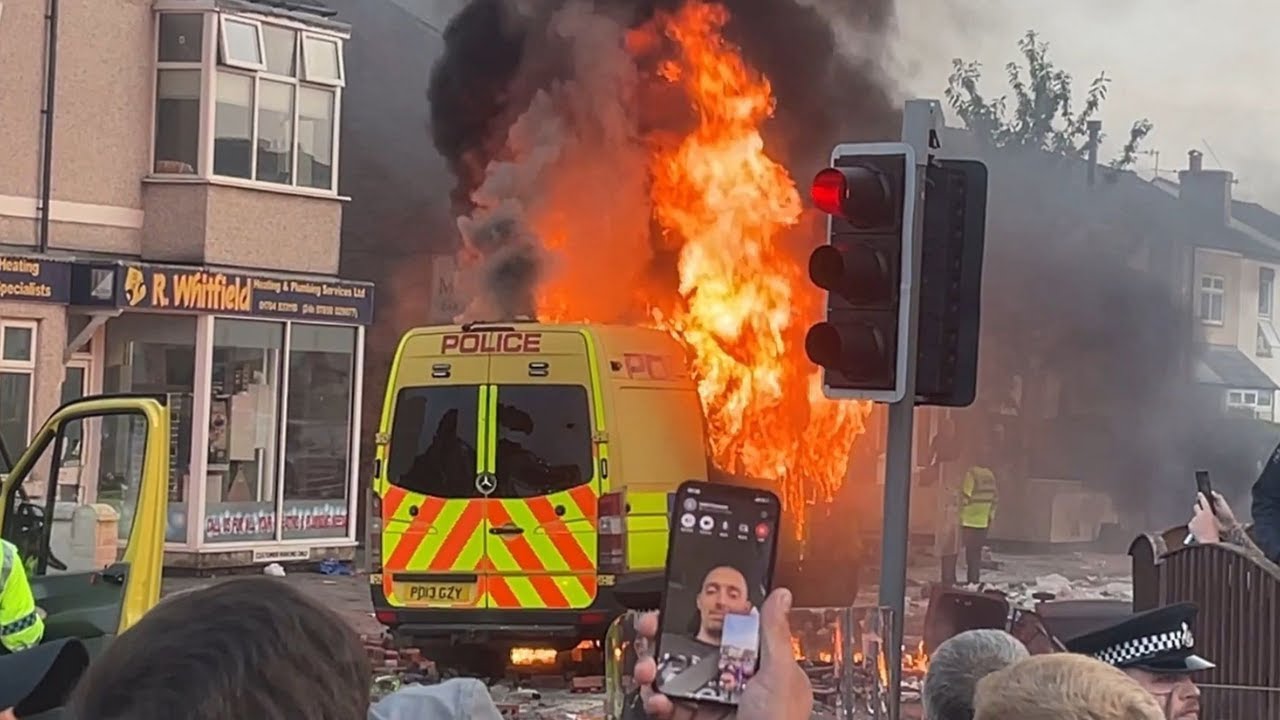
Racist violence targeting minority groups in the United Kingdom has entered its second week, in the worst outbreak of civil disorder the country has seen in more than a decade. Mosques, refugee accommodation, and businesses owned by people of color have been among the targets of far-right extremists, who have rioted in over a dozen towns in England and Northern Ireland.
The unrest began after a mass child stabbing in the northern English town of Southport on July 29, with three girls killed at a dance class. The murders sparked false rumors that a Muslim immigrant carried out the attack. The false claim spread on social media, driven and amplified by high-profile figures, including Nigel Farage, the right-wing politician known for campaigning for Brexit who now leads the Reform UK party. Further unrest is expected, and the extremists are reported to be broadening their targets to include immigration lawyers and charities.
One of the worst attacks was in the northern town of Rotherham, where rioters tried to set fire to a hotel housing asylum seekers. This incident saw 51 police officers injured as they tried to keep rioters out—a particularly high-casualty event for law enforcement in a medium-sized English town.
Other factors have distinguished the violence: its overtly racist nature; the occasional presence of women and children; and the extent and apparent spontaneity of the disorder as it is quickly organized on social media platforms.
But while long-time far-right extremists are suspected of being key organizers, a potent and long-simmering mix of prejudice in the UK has been blamed as an underlying factor for the unrest. Xenophobic and bigoted views, particularly against Muslims and asylum seekers, have become more normalized in the country, with lies and conspiracy theories often repeated by senior ministers in the former Conservative government and some mainstream media outlets.
Social media has come under particular scrutiny, with X (formerly known as Twitter) having played a prominent role. The platform, along with others, was used to spread the lies which preceded the first riots: a false name for the Southport attacker, “Ali al-Shakati,” was mentioned more than 30,000 times on X one day after the murders, according to the Institute for Strategic Dialogue.
Owner Elon Musk has fanned the flames, writing on X that “civil war is inevitable” in the UK. Musk used a conspiracy theory to criticize Labour Prime Minister Keir Starmer, branding him “#TwoTierKier,” after the false “two tier policing” claim that suggests far-right protesters are dealt with more harshly than people of color or left-wing activists and protesters. UK politicians are now calling for Musk to be questioned by parliament.
From The New Humanitarian, Aug. 7
Note: The suspect arrested in the Southport attack is actually a young man born in Wales to Rwandan parents. (BBC News)





Northern Ireland town explodes into anti-immigrant violence
Protests in the small Northern Irish town of Ballymena spiralled into acts of anti-immigrant violence this week after two teenagers of Romanian background were charged with sexually assaulting a local girl.
For three nights, masked rioters burned homes and vehicles in what a chief constable for the Police Service of Northern Ireland called “racist thuggery, pure and simple,” leading to multiple arrests and dozens of injuries. (CBC)
Romanians have been targeted in anti-immigrant violence in Northern Ireland before.
Anti-immigrant protests continue in Dublin
Anti-immigrant protesters burned a police vehicle and attacked officers near a building housing asylum seekers in Dublin on Oct. 21, a day after a man was arrested for an attack on a young girl nearby. Protesters continue to gather, and the situation remains tense.
The unrest comes two years after anti-immigrant protesters triggered a major riot in the center of Dublin after the stabbing of three young children. (Reuters, The Guardian)